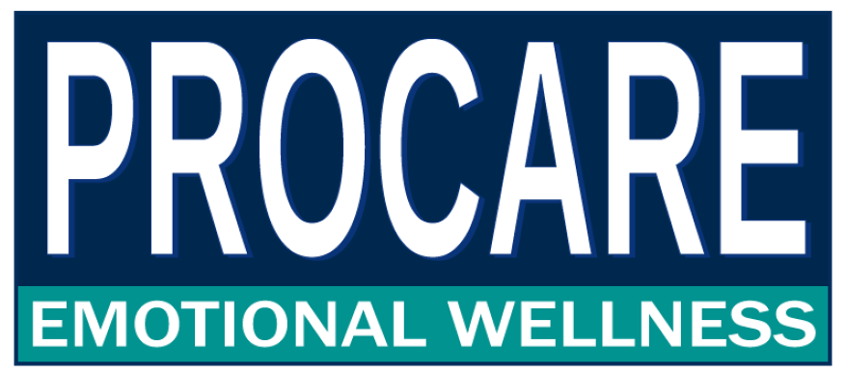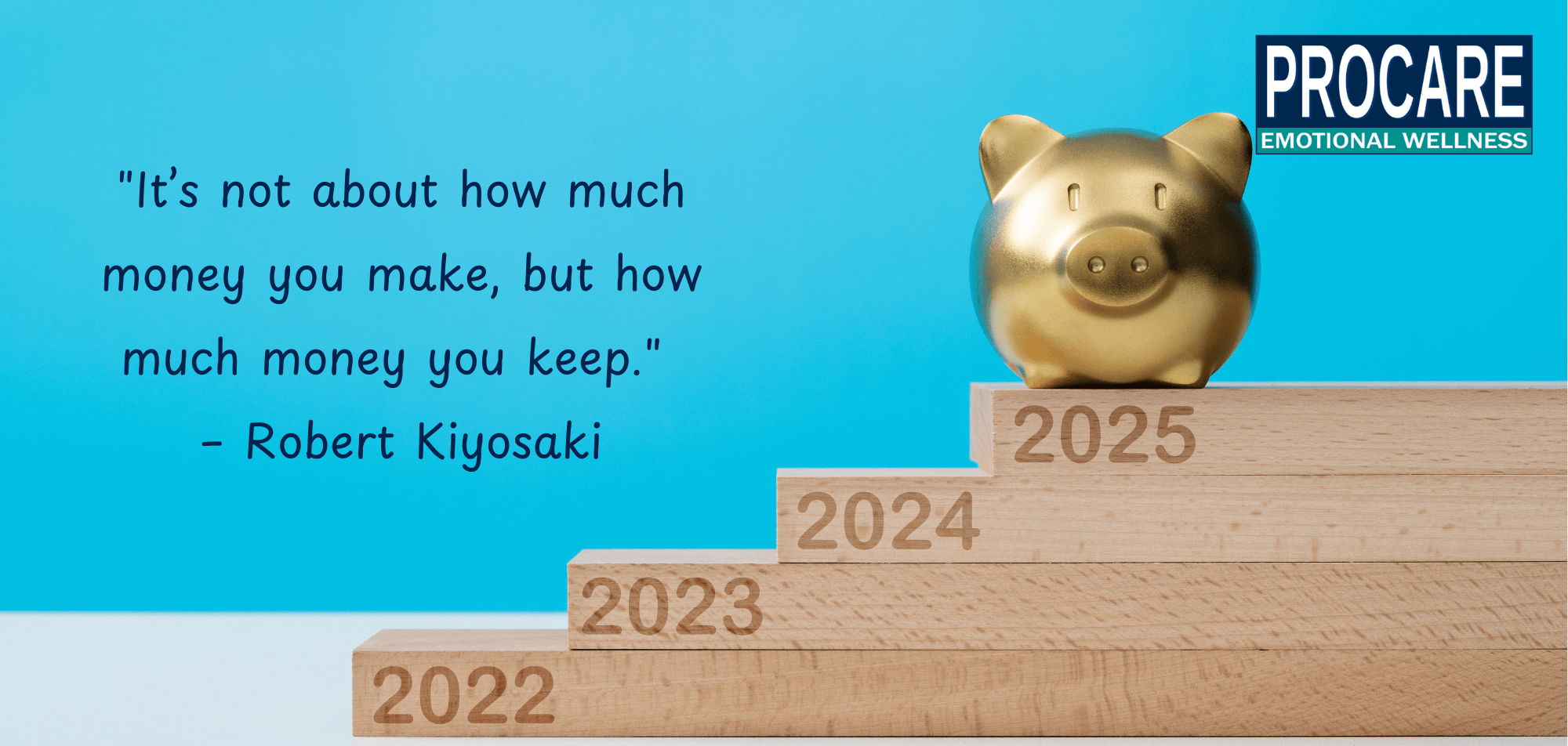Reaching Financial Wellness in 2025
Financial wellness is a cornerstone of overall well-being. In South Africa, where financial challenges such as rising costs of living, unemployment, and high levels of debt are prevalent, achieving financial stability is not just a personal goal but a societal necessity. The 2023 Credit Bureau Monitor revealed that nearly half of South Africa’s credit-active population is over-indebted, demonstrating the critical need for financial education and proactive planning.
At PROCARE, we recognise the link between financial stress and emotional health. By helping individuals achieve financial wellness, we aim to promote holistic well-being. Below, we explore five key steps to reaching financial wellness in 2025 and provide actionable strategies to overcome common challenges.
1. Set Clear Financial Goals
Financial wellness begins with knowing what you want to achieve. Goals provide focus and motivation, turning vague aspirations into actionable plans. Start by reflecting on your life priorities. Do you want to save for a home, pay off debt, or plan for a dream holiday? Categorise these into short-term (1–12 months), medium-term (1–5 years), and long-term (5+ years) goals.
For instance, a short-term goal might be saving R10,000 for emergencies, while a long-term goal could involve investing for retirement. Use the SMART framework to make your goals Specific, Measurable, Achievable, Relevant, and Time-bound. For example, instead of saying, “I want to save money,” define it as “I will save R2,000 per month to build an emergency fund of R24,000 by December 2025.”
Having a mix of achievable short-term goals and ambitious long-term objectives can keep you motivated and guide your financial decisions.
Common mistakes to avoid:
Setting vague or unrealistic goals, like “get rich quickly.”
Trying to accomplish too many goals at once without prioritisation.
Neglecting to adjust goals when your circumstances change.
2. Create and Stick to a Budget
A budget is your financial roadmap, allowing you to manage your income and control your expenses. Begin by tracking your income sources and expenses for a month to understand your spending habits. Divide expenses into fixed (rent, insurance) and variable (groceries, entertainment) categories.
Once you’ve assessed your spending, allocate your income wisely:
50% for needs (housing, transport, groceries).
30% for wants (leisure, hobbies).
20% for savings and debt repayment.
Adjust these percentages based on your priorities. Use budgeting tools like apps or spreadsheets to monitor progress. Sticking to your budget requires discipline. Automating bill payments and savings can reduce the temptation to overspend.
Common mistakes to avoid:
Underestimating expenses, leading to over-budgeting for savings.
Making an unrealistic budget that doesn’t account for occasional indulgences.
Failing to review or update your budget regularly.
3. Reduce and Manage Debt
Debt is one of the most significant barriers to financial wellness, but with a structured approach, it can be managed effectively. Begin by listing all your debts, noting the outstanding amounts, interest rates, and repayment terms. Once you have a clear picture, prioritise repayments.
Two popular strategies include:
The Avalanche Method: Focus on paying off high-interest debts first to minimise total costs.
The Snowball Method: Start with the smallest debts to build momentum and stay motivated.
Additionally, make more than the minimum payments whenever possible, and avoid accumulating new debt. If you’re struggling, consult a debt counsellor to explore options like consolidation or renegotiation.
Common mistakes to avoid:
Paying only the minimum on credit cards, which prolongs debt repayment.
Ignoring debt statements or delaying action until the situation worsens.
Taking out new loans to cover old debts, creating a cycle of dependency.
4. Build an Emergency Fund
An emergency fund is a financial safety net that protects you from unexpected costs like medical emergencies, car repairs, or job loss. It’s one of the most effective ways to reduce financial stress and avoid falling into debt during crises.
Start small if saving a full emergency fund feels daunting. Aim to set aside one month’s living expenses as a starting point, then gradually build up to three to six months’ worth of expenses. Open a separate, interest-earning savings account to keep these funds accessible but out of reach for everyday use.
Automate your savings by setting up monthly transfers from your main account to your emergency fund. This creates a consistent habit and ensures progress.
Common mistakes to avoid:
Assuming you can rely on credit cards instead of building savings.
Dipping into the fund for non-emergencies, like holidays or luxury items.
Believing small contributions won’t make a difference and delaying action.
5. Invest in Financial Literacy
Knowledge is power when it comes to managing your finances. Understanding concepts like interest rates, inflation, and investment options can help you make informed decisions and avoid costly mistakes.
Start by accessing free or affordable resources, such as financial blogs, podcasts, and courses. Attend financial workshops or consult with a qualified financial planner to address your specific needs.
Make it a goal to apply what you learn. For example, if you discover the benefits of compound interest, start investing in retirement accounts or savings products to grow your wealth over time.
Common mistakes to avoid:
Trusting advice from unqualified or biased sources.
Assuming financial literacy isn’t relevant if you’re “bad with numbers.”
Failing to implement what you’ve learned, leaving knowledge unused.
Why Financial Wellness Matters
Financial health is more than just a stable bank balance—it’s about reducing stress, fostering security, and creating opportunities for a fulfilling life. Poor financial habits can lead to cycles of stress, impacting relationships, mental health, and work performance. On the other hand, taking control of your finances empowers you to live more confidently and achieve your personal goals.
At PROCARE, we believe financial wellness is an essential part of holistic well-being. By taking proactive steps to address financial challenges, you can reduce stress and create a brighter, more secure future for yourself and your family.
Let 2025 be the year you take charge of your finances and achieve lasting wellness.
References and Further Reading
National Credit Regulator, South Africa – https://www.ncr.org.za.
Financial Planning Institute of Southern Africa (FPI) – https://www.fpi.co.za.
Mind, UK – "Financial Wellness and Mental Health" – https://www.mind.org.uk.

